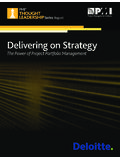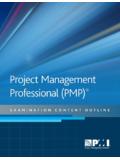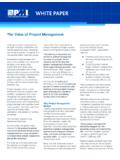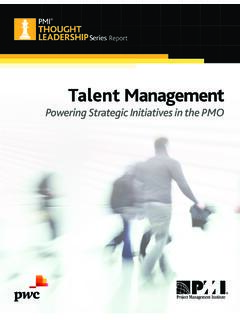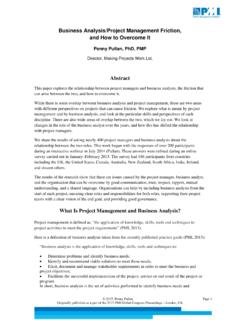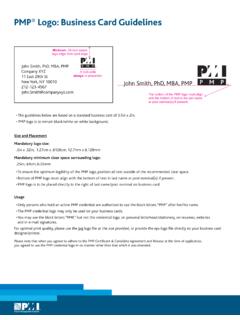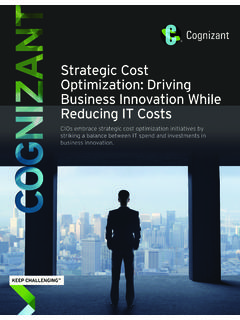Transcription of The High cost of Low Performance | Pulse of the Profession ...
1 2016. 8th Global Project management Survey The High Cost of Low Performance How will you improve business results? Drive Better Results with Project management Customers want the best products and services. Employees want better salaries. Executives want growth. If we can't have perfection, we all want progress. But we know it's hard to deliver consistently positive results in an uncertain and continually shifting global marketplace. Organizations that invest in project management waste 13 times less money because their strategic initiatives are completed more successfully.
2 We know project management is essential for any organization's success, yet the message is not being realized. As we reviewed this year's Pulse of the Profession data, we were hoping to see improvement over last year's results. Instead, we saw declines in many of the success factors we track. Even more concerning, the percentage of projects meeting their goals which had been flat for the past four years took a significant dip. To examine this situation further, we surveyed executive leaders and PMO directors as part of this year's Pulse research and found that, although many individuals are beginning to sharpen their focus on project management as a strategic driver, their organizations aren't always in step.
3 Until leaders throughout organization hierarchies trust that projects deliver strategy, I. fear we will continue to see stagnant progress. And that means organizations will be less successful than they should be. It will take some work, but it can happen if we take a collective approach to help shift the thinking. Use this report and other PMI research to strengthen conversations about the quantifiable benefits project management delivers to organizations. Help drive the transformational thinking needed within your organization because it's together that we can do great things.
4 Mark A. Langley PMI President and CEO. 1. Pulse OF THE Profession | 2016. SUMMARY FINDINGS. Our latest Pulse research shows that compared to last year, fewer projects are being completed within budget or meeting original goals and business intent. More projects are actually failing and creating significant monetary loss for their organizations. The reasons are complex. But with worsening project outcomes, disruptive global trends, and an uncertain economy, it's time to strengthen the conversation around the following issues, which our research indicates are essential to improving both project and business results.
5 LOOK BEYOND TECHNICAL SKILLS. While technical skills are core to project and program management , they're simply not enough in today's competitive global economy, which is growing quickly, but with less predictability. The most successful organizations seek added skills in leadership and business competencies that support and sustain long-range strategic objectives. The ideal skill set a combination of technical, leadership, and strategic and business management expertise is embodied in the PMI Talent Triangle.
6 When organizations focus on all three skill sets, 40 percent more of their projects meet goals and original business intent. more projects meet goals and original business intent 2010 2016 Project management Institute. All rights reserved. RECOGNIZE THE STRATEGIC ROLE OF AN ENTERPRISE-WIDE. PROJECT management OFFICE (EPMO) AND ALIGN IT TO STRATEGY. By supporting the implementation of strategic programs , EPMOs play a crucial role in delivering organizational value. Yet, for many organizations, a struggle exists to define the PMO role, to position it for long-term success, and to leverage the office to help achieve strategic objectives.
7 Effective EPMOs have a broad enterprise-wide responsibility and help direct strategy and focus on value delivery. Organizations that align their EPMO to strategy report 27 percent more projects completed successfully and 42 percent fewer projects with scope creep. DRIVE SUCCESS WITH EXECUTIVE SPONSORS. With actively engaged executive sponsors, organizations can bridge the communications gap between influencers and implementers to significantly increase collaboration and support, boost project success rates, and reduce risk.
8 When more than 80 percent of projects have an actively engaged executive sponsor, 65 percent more projects are successful. Yet, on average, only three in five projects have engaged executive sponsors. 2. Pulse OF THE Profession | 2016. 2,428 192 282. Project management Senior Executives PMO Directors Practitioners In addition to tracking the annual trends in project management , we also spoke directly to executive leaders and PMO directors to capture their perspectives on why we aren't seeing higher project success rates.
9 This year's report draws on our global survey of 2,428 project management practitioners, 192 senior executives, and 282 PMO directors from a range of industries, and interviews with eight corporate leaders and 10 PMO directors and directors of project management . From this research, we have made the following key discoveries: EXECUTIVE AND PMO HEADS PERCEIVE PROJECT management DIFFERENTLY. Executive leaders and PMO directors do not view organizational success and the benefits of project management in the same way.
10 They have significantly disparate views about their organization's Performance when it comes to formulating strategy, prioritizing and funding projects, executing strategic projects, and recognizing lessons learned. Additional gaps in perception exist between the benefits of using formal project management and improving risk identification and management , success with complex projects, customer satisfaction, and success with organizational change. EXECUTIVES AND PMO LEADERS ARE BOTH OPTIMISTIC ABOUT THE FUTURE.
